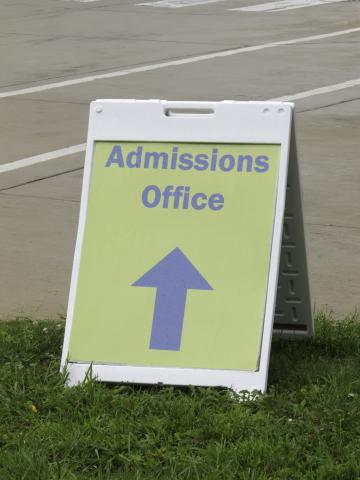When Do College Acceptance Letters Arrive?
Jun 27,2023
Over the last 20 years, the total number of college applications completed has increased by about 150%. More Americans are trying to go to college than ever before. It has led to a dramatic increase in applications that colleges have to deal with.
Because of this, it's taking a little longer for colleges to work their way through these applications for those interested in going to college. It sometimes slows them down from being able to send out college acceptance letters.
Are you anxiously awaiting college acceptance letters so that you can begin putting college plans into place? You should learn about when you can expect acceptance letters to arrive so that you don't let this part of the college application process stress you out too much.
Discover more about when you can anticipate college acceptance letters arriving below. It'll make filling out college applications slightly less stressful than it would be otherwise.
What Is a College Acceptance Letter?
If you plan on going to college, the process will begin with you researching different options and deciding where you'd like to apply. Generally speaking, you will want to fill out college applications for more than just one or two schools.
There are differing opinions out there on how many college applications prospective students should fill out. But many experts recommend filling out somewhere between four to eight college applications. You should fill out applications to schools that you believe you'll get accepted to along with applications to your "dream" schools if possible.
Once you're done filling out these applications, you'll be eager to find out whether or not you've been accepted to your preferred schools. But you'll often have to wait for at least a few months for your applications to be reviewed.
After your applications have been reviewed, you'll then start to receive college acceptance letters in the mail. They'll reveal which schools have accepted you, which have "waitlisted" you, and which have turned your applications down.
Opening your college acceptance letters can be a nerve-racking experience. But it'll also provide you with some of the most exciting moments of your young life.
What Does a College Acceptance Letter Include?
College acceptance letters come in many different forms these days. There are some schools that continue to send out large packets to those who put in applications. There are others that have started to send out only digital forms of communication to applicants.
Either way, you will begin to secure college acceptance letters eventually, and when you open them, you'll find that they'll include a lot of information. Here is some of the info you'll see in a college acceptance letter:
- A thank you from a college for applying to go to their school
- A line indicating whether or not you've been accepted to their school
- Information about what you'll need to do to formally accept an invitation to attend their school if you've been accepted to it
- Additional information about reapplying for their school in the future if your application has been denied
Many college applicants will skip right past all the other parts and focus solely on the line about whether they've been accepted to schools. It's okay to do this at first. But you should be sure to read through everything else in college acceptance letters so you don't miss any important information.
When Will You Get College Acceptance Letters?
From the second you send college applications in, you're going to feel anxious waiting for college acceptance letters to arrive. But you should know it's often going to be at least a couple of months before you begin hearing back from colleges in most cases.
For this reason, you should try to relax after sending your college applications in and celebrate the fact that you're done with that part of the process. Take a break from worrying about going to college and enjoy the other exciting things you have going on in your life.
You should be able to do this for at least a little while before you begin to get anxious again. Here is when you can expect to start seeing college acceptance letters showing up in your mailbox and/or your inbox.
Early Decision College Acceptance Letters
Is there a school that you know you would like to attend? If there is, you should think about taking advantage of the early decision period that most colleges have.
To do this, you will need to send in an application for this particular school very early. More often than not, the deadline for early decision applications will be sometime in November at most schools.
When you apply for a college this early, you'll begin getting college acceptance letters much sooner than others in your class. You should start to get them in December, January, or February depending on which schools you apply for.
Just be aware of the fact that, when you take advantage of the early decision period at most schools, your acceptance will be binding to some degree. It's why you should only apply to a school early if you know for a fact you would like to go there.
Regular Decision College Acceptance Letters
Are you unsure as to which colleges you'd potentially like to attend? If you fall into this category, applying early for schools probably won't be in your best interest.
Instead, you'll want to make sure you send in college applications during the regular decision period. Most of these applications will have deadlines that are in January, February, and maybe March if you're lucky.
When you apply to schools during this period, you should start to get college acceptance letters in March and April for the most part. Although you'll be cutting it close when it comes to picking a school, it'll still give you time to choose the right college based on the letters you get back from them.
Waitlisted College Acceptance Letters
When you open up most college acceptance letters, they'll let you know that your application has been either approved or denied. But there is a chance that you might get "waitlisted" at certain schools.
What does this mean? Well, it means that a school believes you meet all the criteria to be accepted to their institution but that they can't officially accept you yet due to the large number of applications they received. You'll essentially be forced to wait to find out if the school will have enough space to send you a true college acceptance letter.
Getting waitlisted at a school can be frustrating. It can hold up your college plans if the school that waitlists you is the one you'd like to attend most. It can also put you in a position where you might have to wait until July or even August to find out if this school will have room for you.
You'll have a difficult decision to make if you get waitlisted by a college. You'll need to decide if it's worth waiting on this college or if you should go to another school.
What Should You Do With College Acceptance Letters?
If you only fill out a few college applications, you shouldn't have too much trouble keeping track of college acceptance letters when they begin coming in. But if you apply for, say, a dozen colleges or more, it might be tricky keeping tabs on all your college acceptance letters.
It'll be important for you to take the right steps when it comes to dealing with college acceptance letters. We've laid out the steps you should take here.
Keep College Acceptance Letters Organized
As soon as you start seeing college acceptance letters show up in your mailbox and/or inbox, you'll need to figure out a good way to organize them. First and foremost, you should break them down based on whether they say you've been accepted to a school, denied, or waitlisted.
From there, you might also want to create a spreadsheet that clearly shows:
- The deadlines for responding to letters
- The methods by which you'll need to respond to letters
- The deposits you'll need to put down when responding to letters
When you only have a few college acceptance letters, it'll be easy to keep track of them. But when you have a bunch of them, you might find yourself getting confused when it comes to how you'll need to respond to them.
Coming up with a good organizational system for your college acceptance letters will keep your stress levels down. It'll also guarantee you don't miss out on the chance to attend a school you love because you forget to respond to a college acceptance in time.
Compare Schools That Send College Acceptance Letters
If your ultimate "dream" school sends you a college acceptance letter letting you know you got in, you might not need to worry about comparing the schools that send you letters. But otherwise, you'll need to go through the college acceptance letters you get and compare each of the schools that you can attend.
While doing this, you should pay close attention to everything from the programs these schools offer to the tuitions they charge. You should also consider things like:
- Where they're located
- What kind of reputations they have
- What their student bodies are like
- Which extracurricular activities they offer
- And more
You should also sneak a peak at what these colleges will do to help you find a job in your preferred field later. By evaluating these kinds of things, you should be able to decide which schools would be the very best options for you.
Narrow Down Schools That Send College Acceptance Letters
When you reach this point, there should be one or two colleges that are starting to separate themselves from the pack. They'll be the colleges that will seem like the best fit for you.
Your goal should be to narrow down all your options to just one college that you'd like to attend. It should be able to extend everything you'll need to make the most of your college plans.
When Do You Need to Respond to College Acceptance Letters?
You're more than likely going to feel a huge sense of relief when you receive all your different college acceptance letters. You'll love the fact you won't be forced to wait around for them anymore in a panic.
But shortly after you get all your college acceptance letters back, a new wave of anxiety might crash over you. You'll start to feel pressure to respond to these letters.
The good news is that most schools aren't going to require you to provide them with an immediate response. But if you'd like to accept a spot at a school, you will need to hit a certain deadline in most cases.
The college acceptance letters you receive should all have deadlines on them. Make sure you write these deadlines down so you don't accidentally miss any of them and hurt your chances of being accepted into a school.
How Should You Respond to College Acceptance Letters?
Every school will have a slightly different system in place for those who would like to respond to college acceptance letters by accepting spots. You should read through every word of these letters to see what you'll need to do.
More often than not, you'll be asked to either mail or email back a form letting a school know that you would like to accept their offer to attend their college. You'll also usually be asked to put down a deposit to show a school you're serious about attending it.
Technically, you will still be able to back out of your commitment if you're willing to part ways with this deposit. But the deposit is designed to make your commitment as official as it gets. You'll be able to start telling people which college you'll be attending in the fall.
Should You Respond to All College Acceptance Letters?
One thing college applicants don't always realize is that it's important to respond to all college acceptance letters as best you can. You should try not to only respond to the college you'd like to attend.
By letting a college know you would like to take yourself out of the running, you'll free up a spot for someone else. It'll give them the opportunity to get moved off the waitlist long before the summer starts.
With this in mind, it would be nice for you to respond to all college acceptance letters as long as you have the time to do it. Just try not to turn any schools down until you're 100% sure you don't want to attend them. It'll be difficult to get back into their good graces down the line.
What If You Don't Respond to College Acceptance Letters?
Unfortunately, not everyone responds to college acceptance letters. It's why some college applicants get left on the waitlists at their preferred schools for so long.
But if you don't respond to college acceptance letters, you should know it won't be the end of the world on your side. Colleges will simply assume you're no longer interested in attending them when they don't ever hear back from you.
This will help you avoid having to respond to every single college acceptance letter you receive if you get your hands on a lot of them. But it can obviously also create some confusion if you fail to respond to a college letting them know you'd like to accept their offer by their deadline.
You should try not to hesitate too much to respond to a college that you'd like to go to once you get a college acceptance letter from them. The sooner you get back to them, the sooner they'll be able to earmark a spot for you.
What Should You Do After Responding to College Acceptance Letters?
After receiving college acceptance letters in the mail or through email and responding to them accordingly, you'll be able to let out a huge sigh of relief. You'll be just about finished with the college application process.
You shouldn't take your foot off the gas, though, and decide that you're done with the process altogether. There will still be things you'll have to do between the time you get accepted to colleges and you start attending school. Here they are.
Keep Working Hard in School
You're going to be at least a little tempted to stop working hard in school once you know you've been accepted to a college. So-called "senioritis" often sets in for those who are high school seniors, in particular.
But you should try not to get complacent during your final months of high school even though you know you'll be heading off to college in the fall. You should make sure you'll be able to graduate on time with the highest GPA possible. It could play a part in your ability to obtain scholarships, grants, and more.
Stay Out of Trouble
If you happen to get into any trouble between the time you're accepted to a college and the time you start attending it, it might not bode well for you. If, for instance, you post something controversial on social media or even go as far as to get arrested for something, it could impact your college plans.
You should do your best to enjoy your final months of being a high school student without causing any trouble. The last thing you want to do is jeopardize the chances of you going to college by making a poor decision.
Apply for Scholarships, Grants, Financial Aid, Loans, Etc.
It's expensive to go to college these days. The average college student ends up spending between $30,000 and $40,000 per year for college.
If you come from a family that can afford to spend that much money on college, you won't have to worry about the financial aspect of it too much. But if you know your family won't be able to foot the bill, you'll need to look into how you're going to pay for school ASAP.
There may be scholarships and grants available that you can qualify for. There might also be financial aid opportunities and even student loans you can take out.
Whatever you do, don't wait until the last minute to try to come up with a way to pay for college. If you do this, it could result in you making bad choices and possibly biting off more than you can chew while applying for student loans to pay your way through school.
Should You Hang On to College Acceptance Letters?
After you're done with college acceptance letters, your first instinct might be to throw them away. You won't really need to keep them once you've settled on the school you want to attend.
But it might be worth keeping them anyway. They'll be a reminder of the process you went through while trying to choose a college.
You might also find that your college acceptance letters will come in handy later if you decide to transfer to a different school. You may want to go back through them to see which other schools could be a good fit for you.
Make Going to College the Best Experience Possible
Going to college will be one of the best experiences you ever go through in your entire life. But this experience will actually begin long before you head off to school.
Going to college will begin with you applying for schools and waiting on college acceptance letters. It's why you should know all about this part of the process. It'll give you an idea of what to expect from it and allow you to soak it all up as you prepare for college to start.
Get more tips on applying for college and looking for scholarship opportunities by poking around on the Honor Society website and blog.





